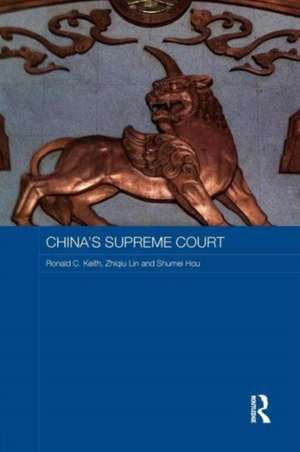China's Supreme Court: Routledge Contemporary China Series
Autor Ronald C. Keith, Zhiqiu Lin, Shumei Houen Limba Engleză Paperback – 3 mar 2016
| Toate formatele și edițiile | Preț | Express |
|---|---|---|
| Paperback (1) | 469.34 lei 6-8 săpt. | |
| Taylor & Francis – 3 mar 2016 | 469.34 lei 6-8 săpt. | |
| Hardback (1) | 1060.52 lei 6-8 săpt. | |
| Taylor & Francis – 24 oct 2013 | 1060.52 lei 6-8 săpt. |
Din seria Routledge Contemporary China Series
-
 Preț: 326.21 lei
Preț: 326.21 lei -
 Preț: 339.65 lei
Preț: 339.65 lei -
 Preț: 311.41 lei
Preț: 311.41 lei -
 Preț: 280.32 lei
Preț: 280.32 lei -
 Preț: 317.85 lei
Preț: 317.85 lei -
 Preț: 350.12 lei
Preț: 350.12 lei - 18%
 Preț: 1059.45 lei
Preț: 1059.45 lei - 28%
 Preț: 848.57 lei
Preț: 848.57 lei - 18%
 Preț: 1223.21 lei
Preț: 1223.21 lei - 18%
 Preț: 1060.74 lei
Preț: 1060.74 lei -
 Preț: 422.90 lei
Preț: 422.90 lei - 18%
 Preț: 954.20 lei
Preț: 954.20 lei - 18%
 Preț: 1169.66 lei
Preț: 1169.66 lei - 18%
 Preț: 1049.84 lei
Preț: 1049.84 lei - 18%
 Preț: 1217.95 lei
Preț: 1217.95 lei - 18%
 Preț: 1222.16 lei
Preț: 1222.16 lei - 28%
 Preț: 823.99 lei
Preț: 823.99 lei - 18%
 Preț: 1061.93 lei
Preț: 1061.93 lei - 18%
 Preț: 1057.89 lei
Preț: 1057.89 lei - 18%
 Preț: 1112.03 lei
Preț: 1112.03 lei - 18%
 Preț: 1008.02 lei
Preț: 1008.02 lei -
 Preț: 416.82 lei
Preț: 416.82 lei - 25%
 Preț: 823.99 lei
Preț: 823.99 lei - 18%
 Preț: 1114.70 lei
Preț: 1114.70 lei - 15%
 Preț: 702.39 lei
Preț: 702.39 lei - 28%
 Preț: 526.88 lei
Preț: 526.88 lei - 18%
 Preț: 712.13 lei
Preț: 712.13 lei - 18%
 Preț: 1065.06 lei
Preț: 1065.06 lei - 18%
 Preț: 703.09 lei
Preț: 703.09 lei - 18%
 Preț: 1060.87 lei
Preț: 1060.87 lei - 18%
 Preț: 1057.89 lei
Preț: 1057.89 lei - 18%
 Preț: 1062.98 lei
Preț: 1062.98 lei - 18%
 Preț: 1222.16 lei
Preț: 1222.16 lei - 18%
 Preț: 1055.51 lei
Preț: 1055.51 lei -
 Preț: 413.55 lei
Preț: 413.55 lei - 18%
 Preț: 1001.84 lei
Preț: 1001.84 lei -
 Preț: 386.57 lei
Preț: 386.57 lei - 18%
 Preț: 1055.38 lei
Preț: 1055.38 lei - 18%
 Preț: 1053.95 lei
Preț: 1053.95 lei - 18%
 Preț: 1061.57 lei
Preț: 1061.57 lei - 18%
 Preț: 1058.79 lei
Preț: 1058.79 lei - 18%
 Preț: 1109.18 lei
Preț: 1109.18 lei - 18%
 Preț: 1053.47 lei
Preț: 1053.47 lei - 18%
 Preț: 1053.16 lei
Preț: 1053.16 lei - 18%
 Preț: 728.24 lei
Preț: 728.24 lei - 18%
 Preț: 1055.38 lei
Preț: 1055.38 lei - 18%
 Preț: 1165.87 lei
Preț: 1165.87 lei - 18%
 Preț: 1227.38 lei
Preț: 1227.38 lei - 15%
 Preț: 701.45 lei
Preț: 701.45 lei
Preț: 469.34 lei
Nou
Puncte Express: 704
Preț estimativ în valută:
89.84€ • 97.62$ • 75.51£
89.84€ • 97.62$ • 75.51£
Carte tipărită la comandă
Livrare economică 21 aprilie-05 mai
Preluare comenzi: 021 569.72.76
Specificații
ISBN-13: 9781138657175
ISBN-10: 1138657174
Pagini: 248
Dimensiuni: 156 x 234 x 22 mm
Greutate: 0.45 kg
Ediția:1
Editura: Taylor & Francis
Colecția Routledge
Seria Routledge Contemporary China Series
Locul publicării:Oxford, United Kingdom
ISBN-10: 1138657174
Pagini: 248
Dimensiuni: 156 x 234 x 22 mm
Greutate: 0.45 kg
Ediția:1
Editura: Taylor & Francis
Colecția Routledge
Seria Routledge Contemporary China Series
Locul publicării:Oxford, United Kingdom
Public țintă
PostgraduateCuprins
1. The Supreme People’s Court in China’s Struggle for the Rule of Law 2. The Pragmatic Formatting of 'Justice and Efficiency' 3. The Supreme People’s Court and the Local Courts 4. The Supreme People’s Court and Recent Death Penalty Reforms 5. The Supreme People’s Court, Judicial Review and Transparency 6. The Supreme People’s Court: Between power and principle.
Descriere
This book examines the learning curve of the People’s Supreme Court of China as an expanding Chinese national institution that has played a key role in the struggle for the rule of law in China. Within the unity of state administration and the requirements of the constitution, the court has negotiated the changing tension between politics and law through improvising new formats of interpretation and supervision in response to the changing priorities of revolution and market reform.


























